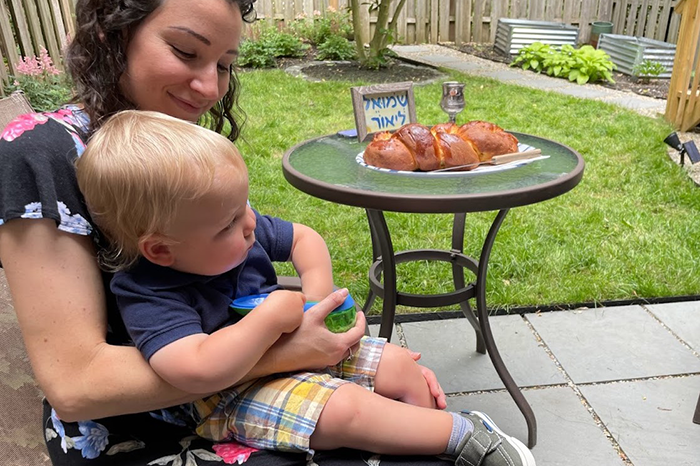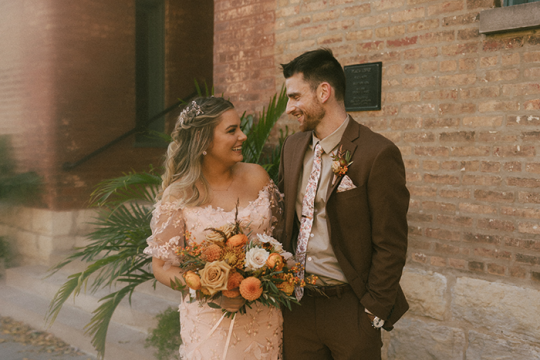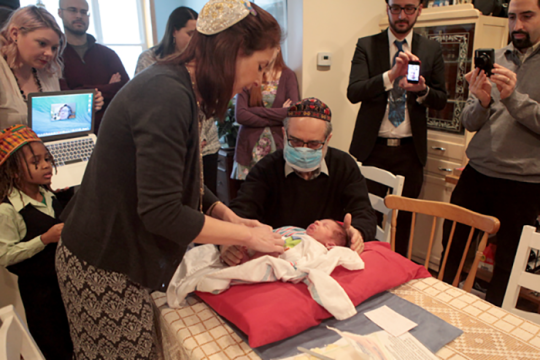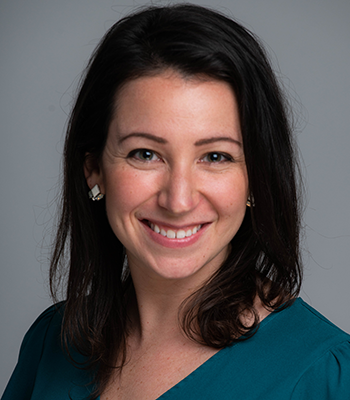
When I found out I was pregnant, my mind was immediately filled with questions and plans. When my son Logan was born at 34 weeks, many of those plans quickly changed.
Did I mention this was in January 2021, at the height of the COVID-19 pandemic?
My husband Chris and I knew we wanted to have Logan circumcised, but given our concerns about Logan's susceptibility to infection as a preemie, we decided to have this done before he was discharged from the hospital. It was not the meaningful moment I'd previously envisioned, as only one of us was allowed to be in the room with him. We decided we would have a Jewish baby naming ceremony later.
After our discharge from the NICU, the early months of parenthood were a blur. As I struggled to gain my footing, it never felt like the "right time" to celebrate a meaningful moment like a naming. Because Logan's first birthday coincided with another peak in COVID-19 infections and two of our immediate family members were considered high risk, we still didn't feel comfortable hosting an indoor celebration, even at that milestone. I felt like I had missed the opportunity to hold a naming ceremony.
I reached out to the rabbi who had officiated our wedding and asked for advice. He said that since we were well past the traditional eight days, there was no wrong answer so we should just pick a day. We decided to aim for when Logan turned 18 months old. Eighteen's a meaningful number in Judaism and the ceremony would take place in summer so we could have an outdoor gathering.
All that was left to do was create the ceremony. Being heavily involved in planning our wedding ceremony was extremely meaningful to both Chris and me, so we wanted to do the same for Logan's naming ceremony.
But how could I involve my Catholic-raised husband in planning a ceremony that is inherently Jewish and intended to bring our son into the covenant of Judaism?
The answer, like so many things in marriage, involved compromise. Similar to many Jewish "welcome baby" ceremonies, we included parts of the traditional naming ceremony in Hebrew, but we also made our own speeches and said certain blessings in English. We tied strips of lace from my late mother-in-law's wedding gown onto my father's tallit.
Sharing the origins of our son's Hebrew name, Shmuel Lior, was the highlight of the event. We drew inspiration for Logan's Hebrew and secular names from each of our families, especially my late grandmother and mother-in-law's names. At the ceremony, we shared our memories of those beloved family members and the qualities that we connected with our son's name. I also painted a watercolor of his name, which in part means "my light."
We also revisited particularly meaningful parts of our wedding ceremony. As we signed our ketubah at our wedding, our fathers recited the traditional threefold blessing over us in Hebrew and English. At Logan's naming, they recited the same blessing for him. We also used my bat mitzvah kiddush cup for our wedding and Logan's naming. Finally, we asked everyone present to join us in saying the Shechecheyanu, the Jewish blessing for joyful beginnings, in Hebrew and English.
Of course, when a toddler is involved instead of a sleepy eight-day-old baby, things don't always go according to plan. Logan walked into the circle of guests before he was officially welcomed with the traditional "Baruch Haba," meaning, "blessed is he who comes." He refused to let us wrap him in a tallit, insisting on wearing it like a cape as he snacked his way through most of the ceremony.
It may have been nontraditional, but Logan's naming ceremony, with its melding of tradition and innovation, was an important chapter of our family story and a wonderful reminder of our monumental task as parents.
Chris, my husband, says that the naming ceremony was a learning experience. Helping create a ritual that felt accessible to him helped deepen his understanding of my Jewish identity and allowed him to be an active participant. Most importantly, he deepened his understanding of the Jewish faith and identity that will be integral in his son's life.
There are many circumstances where someone who is past the traditional baby naming age might have a naming ceremony. Perhaps they are a Jew by choice or are transgender and choosing a new Hebrew name.
If a naming ceremony is important to you and your family, don't overthink the timing-just make it happen! Talk with a rabbi or cantor if you want Jewish clergy to officiate (although you can conduct a naming ceremony yourself) and figure out ways to make your ceremony meaningful for everyone involved.
Related Posts

Meet My Interfaith Family: Graaff-Sodds

Nine Spring-Inspired Hebrew Names


